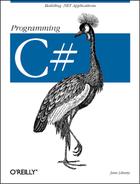Boxing
and
unboxing are the processes that enable value
types (e.g., integers) to be treated as reference types (objects).
The value is “boxed” inside an Object,
and subsequently “unboxed” back to a value type. It is
this process that allowed us to call the ToString( ) method on the integer in Example 5-4.
Boxing is an implicit conversion of a value type to the type
Object. Boxing a value allocates an instance of
Object and copies the value into the new object
instance, as shown in Figure 5-4.
Boxing is implicit when you provide a value type where a reference is
expected and the value is implicitly boxed. For example, if you
assign a primitive type such as an integer to a variable of type
Object (which is legal because
int derives from Object) the
value is boxed, as illustrated here:
using System;
class Boxing
{
public static void Main( )
{
int i = 123;
Console.WriteLine("The object value = {0}", i);
}
}
Console.WriteLine( ) expects an object, not an
integer. To accommodate the method, the integer type is automatically
boxed by the CLR, and ToString( ) is called on the
resulting object. This feature allows you to create methods that take
an object as a parameter; no matter what is passed in, reference or
value type, the method will work.
To return the boxed object back to a value type, you must explicitly unbox it. You should accomplish this in two steps:
Make sure the object instance is a boxed value of the given value type.
Copy the value from the instance to the value-type variable.
Figure 5-5 illustrates unboxing.
For the unboxing to succeed, the object being unboxed must be a
reference to an object that was created by boxing a value of the
given type. Boxing and unboxing are illustrated in
Example 5-5.
Example 5-5. Boxing and unboxing
using System;
public class UnboxingTest
{
public static void Main( )
{
int i = 123;
//Boxing
object o = i;
// unboxing (must be explict)
int j = (int) o;
Console.WriteLine("j: {0}", j);
}
}
Example 5-5 creates an integer i
and implicitly boxes it when it is assigned to the object
o. The value is then explicitly unboxed and
assigned to a new int whose value is displayed.
Typically, you will wrap an unbox operation in a try block, as
explained in Chapter 11. If the object being
unboxed is null or a reference to an object of a different type, an
InvalidCastException is thrown.


